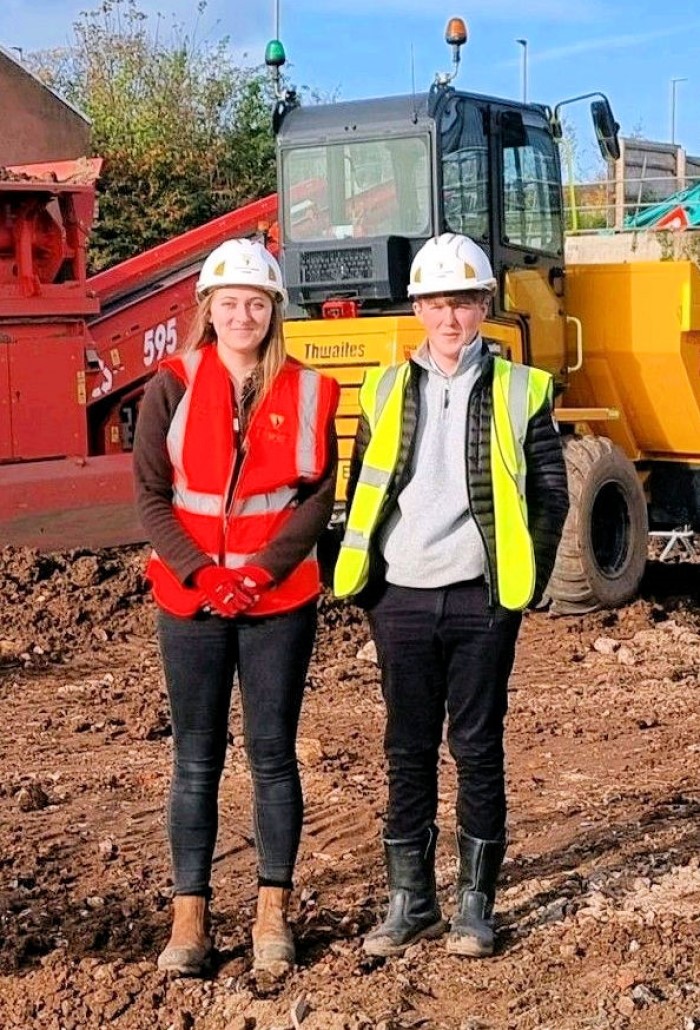Students taking the new construction T Level courses will find out their results today. CM hears from the graduates and their new employers.

The first cohort of T-Level students received their results today, with over 92% achieving a pass or above. Among the 1,000 students who took the courses, many graduates from construction T Levels have already secured their first job or apprenticeship or university place.
What are T Levels?
The Government introduced T-Levels in 2020 as part of its Post-16 Skills Plan. They are a new qualification at education level 3, taken after completion of GCSEs, and equivalent to three A-Levels.
Construction T-Levels include:
- Building Services Engineering for Construction
- Design, Surveying and Planning for Construction
- Onsite Construction
The two-year courses aim to provide a technical-based qualification that meets the needs of employers and prepares students for work, further training, or study.
Official figures show that 93.7% of students taking the Design, Surveying and Planning for Construction T-Level achieved a ‘pass’ or above.
Companies including Morgan Sindall and Miller Homes have helped shape the content for construction’s T-Levels. Each course includes a nine-week industry placement. Several leading construction companies have offered positions to T-Levels graduates.
Willmott Dixon and T-Levels
Wilmott Dixon has taken on two T-Level student graduates as permanent trainees within the business, on higher apprenticeships, working four days on site, and attending university one day per week as part of their degree course.
Both took a Construction Design, Surveying and Planning T-Level at Exeter College and did placements with Willmott Dixon. Charlotte Barons was awarded a distinction and Ed Grimshaw was one of only seven students in the country to achieve a distinction star.

Danielle Haskins, social value manager at Willmott Dixon, says: “The main benefit of the T-Level is that it was designed by construction professionals for the next generation of construction professionals. This means that what the students are learning is exactly what we need within the industry both now and in the future.
Lack of relevant experience
“One of the biggest hurdles we have found in construction is that new entrants are joining with qualifications, but not having had any relevant experience. That is why this qualification is like no other, offering a great ratio of work experience to academic study.
“The management teams work closely with the students, and they are doing real jobs. This will equip them with the construction management skills that they need, and that we as a business need, to succeed.”
“This qualification is like no other, offering a great ratio of work experience to academic study.”
Haskins says the placements provided “invaluable” experience for both the students.
“This means they will be joining a company they have a connection with,” she explains. “They understand how we operate, our vision and values. They understand what is expected of them and have the knowledge and skills to back that up.”
Adding productivity
Haskins says Willmott Dixon will be saving costs recruiting T-Level graduates but adds that this is not the primary consideration.
“We can see that these students really do add to productivity and are helping us to fill the skills gaps in our business and the wider industry,” she says. “As well as enhancing our skills set, we know that recruitment and salary costs are reduced, giving us the chance to use that overhead saving to recruit experienced people into senior roles.
“Many of our customers also wish to see us employing students at this level so, by doing so, this can help us attract new business.”
Willmott Dixon’s T-Level graduates
Charlotte Barons and Ed Grimshaw will be working at Willmott Dixon four days and attending university one day per week as part of their degree course.
Barons will be a production management trainee and will assist the site management team with the day to day running of projects. Her responsibilities will include health and safety, programme and quality. This will lead on to an assistant build (site) manager role.
“I completed a T-Level in construction at Exeter college, which involves studying design, surveying and planning,” she explains. “We covered many topics including health and safety, modular design, construction law and maths. During the course we had to complete 315 hours of work experience.
“Willmott Dixon has been working closely with Exeter college and they offered me with a work experience placement at their Innovation Centre project in Taunton.
“I have been able to understand how the dynamics of a large site work, much better than I would have done in college.”
“Since going to work at the project, I have been able to read plans and understand how the dynamics of a large site work, much better than I would have done in college. This will help me when I start my trainee management scheme with Willmott Dixon in September.”
Quantity surveyor role
Grimshaw will be a commercial management trainee, assisting the site quantity surveyor to manage project costs. This will lead to a job as an assistant quantity surveyor.
“Having done a work placement with Willmott Dixon for six months, in different job roles and departments, I have really got to grips with the way they work as a company,” he says. “I gained good hands-on experience in each job role and what the day-to-day responsibilities are. I can see how they all interlink and how they work together.
“I now have a broad view of the industry and understand how much work goes into a project. Thanks to the placement, I was able to apply and be accepted on to their management trainee scheme starting in September.”
Lewin Electrical Services
Lewin Electrical Services is supporting two construction T-Level students on industry placement. This is helping the business to overcome concerns about having trainees and the skills to mentor to them.
The electrical contractor says the main benefit of the industry placement is that the T-Level students gain confidence in themselves, stepping out of their comfort zones to use new technical skills in real work environments.
Daniel Lewin, owner of Lewin Electrical Services, says: “Working with Leicester College, we can bring the next generation into the trade, giving T-Level students the 45-day industry placement required to complete their course.
“We have built a relationship with our local college and took time to observe T-Level students within the classroom and workshop environment, talking to students after lectures and interviewing them. This meant we got a good feel for the students and their skills and who we could support them on industry placement.
“The students have made a big difference to our workplace. We share our skills and experience to help them to progress, and they share their new skills with us too.”

Construction T-Levels as preparation for degrees
Some T Level graduates are using their qualifications to move on to university construction degrees.
Matthew Short from Cornwall was interested in a construction career but not sure which area to specialise in. He opted to take the T-Level in Design, Surveying and Planning at Penwith College because it offered multiple career options.
He has secured a place at Bristol University to study building surveying and hopes to work for a surveying firm in the future.
Comments
Comments are closed.










Isn’t it another name for the old ONC qualification??
The 2 year course may well be equal to the old ONC, but I can’t see that it’s a qualification that gains entry to University. In my day – 1964, you had to pass your ONC & then go onto passing the 2 year HNC course, before you could be considered for Uni. But good luck to these students, the Industry badly needs loads more qualified staff & workers. I started work in ’64 with the Mitchell Construction Kinnear Moodie Group Ltd. & they reckoned that a Graduate needed 3 years full time with the Company after Uni before they were fully productive!
I support this completely. I did a Laing “pupilship” 50 years ago – and this is just the same. A great credit to this year’s successful stutents – now graduates. I hope this launches them on the same wonderful life I have had in construction. My very best wishes to them all.